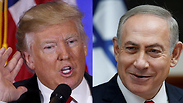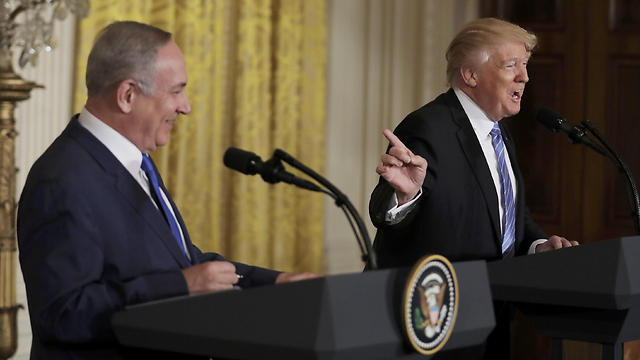
Trump and Netanyahu
צילום: רויטרס
US warning to Israel signals new backpedaling by Trump
Trump's administration seems to be going back and forth on their promises and statements toward Israel; Defense Minister Lieberman concurs, saying, 'We received a direct message from the United States... that imposing Israeli sovereignity on the West Bank would mean crisis with the new administration.'
The Trump administration has explicitly warned Israel against annexing parts of the West Bank, saying it would trigger an "immediate crisis" between the two close allies, Israel's Defense Minister Avigdor Lieberman (Yisrael Beytenu) said Monday.
It was the latest indication that President Donald Trump is returning to more traditional US policy and will not give Israel free rein to expand its control over the West Bank, as Israeli nationalists had hoped.
"We received a direct message—not an indirect message and not a hint—from the United States. Imposing Israeli sovereignty on the West Bank would mean an immediate crisis with the new administration," Lieberman said, shortly before departing for a diplomatic visit to the US.
The US's reaction was sparked by comments by MK Miki Zohar, a junior lawmaker in Prime Minister Benjamin Netanyahu's Likud Party.
Zohar is among a growing number of coalition members who reject the idea of a Palestinian state and instead suggested that Israel annex the West Bank.
Under this version of a "one-state" scenario, the West Bank's more than 2 million Palestinians would receive expanded autonomy, but not hold full Israeli citizenship or be allowed to vote for the Knesset, or parliament. Although Netanyahu has not endorsed the one-state vision, many in his coalition do.
"One state at this moment means apartheid," MK Ayman Odeh, the leader of the Joint List of Arab parties in parliament, told foreign reporters Monday. "I think there needs to be great pressure for a Palestinian state to be established on the 1967 borders."
Lieberman said he received phone calls "from the entire world" about whether Zohar's proposal reflected the government's position.
He called on the coalition to "clarify very clearly that there is no intention to impose Israeli sovereignty."
Justice Minister Ayelet Shaked (Bayit Yehudi), who supports a partial annexation of the West Bank, said she was unaware of any controversy with the Trump administration and that Israel in any case is free to do as it sees fit.
"We are an independent and sovereign state," she told Israel's Army Radio station. "There is a supportive administration in the United States. That administration needs to back up the state of Israel and the government's policy."
Trump's campaign platform made no mention of a Palestinian state. He also promised to move the US Embassy in Israel from Tel Aviv to Jerusalem, a move long sought by Israel but fiercely opposed by the Palestinians.
During the campaign, Trump maintained close ties with Israel's West Bank settler movement and even invited a settler delegation to his inauguration.
But since then, he has shown repeated signs of backtracking.
Trump now says the embassy issue needs further study. During a White House press conference with Netanyahu last month, Trump asked the Israeli leader to "hold back on settlements."
He also said he was open to either a two-state or one-state solution, as long as it was through an agreement with the Palestinians.
The same week, Trump's envoy to the UN, Ambassador Nikki Haley, said the US "absolutely" supports a two-state solution, while his nominee for ambassador to Israel, David Friedman, a close ally of the settlers, said he "would be delighted" with such an agreement.
The mixed signals appear to be creating confusion among Israelis and Palestinians.
Last week, Netanyahu was quoted by local media as telling a closed meeting that his attempts to coordinate settlement construction with the US were "not as simple as you think they are." His office declined requests for comment.
Palestinian officials, meanwhile, have barely had contact with the new administration.
Nabil Shaath, President Mahmoud Abbas' foreign relations adviser, said the US position "regarding settlements on the Palestinian lands is not clear to us."
"We need to hear from the US administration, from President Trump, directly about his positions," he said.
Oded Revivi, the chief foreign envoy of the Yesha Settlers Council, said he was "waiting patiently" for what he expects to be a favorable agreement between Israel and the White House on permissible settlement construction.
"I understand that it's taking a bit longer than what may have been anticipated by some of my peers," Revivi said. But he said Trump "seems to be a man of his word... We are still relying on what he promised."
Laurie Cardoza-Moore, a prominent pro-Israel evangelical leader in the US and president of Proclaiming Justice to the Nations, said she is also optimistic that Trump will allow widespread settlement construction and carry out the embassy move.
"If he doesn't follow through on these commitments, the evangelical Christian world will rise up in opposition to his policies," said Cardoza-Moore. "We will put him on notice that life will not be easy."












